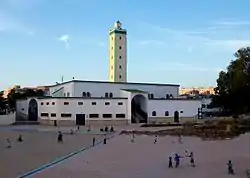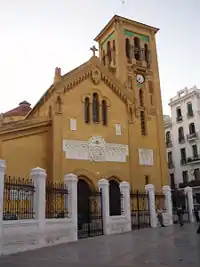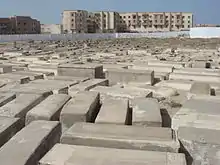Religion in Morocco
The main religion in Morocco is Islam, which is the state religion, although freedom of religious belief is also guaranteed to all.[1] Officially, 99% of the population are Muslims, and virtually all of those are Sunni.[2] Polls and surveys have found that 80–95% of its population is at least somewhat religious.[3][4] The second-largest religion in the country is Christianity,[5] but most Christians in Morocco are foreigners. There is a community of the Baháʼí Faith. Only a fraction of the former number of Jews have remained in the country, many having moved to Israel.
Islam

According to The World Factbook maintained by the American Central Intelligence Agency, and a 2009 report by the Pew Research Center, about 99% of Moroccans are Muslims.[2][6] Almost all of those are Sunni,[2] although Pew reported in 2012 that when asked which sect they belong to, 67% of those surveyed answered Sunni, while 30% volunteered only that they were Muslim; none replied Shia.[7] 50% of those who said they were Sunni did not believe that Shias were Muslims.[8]
Islam reached Morocco in 680 CE, taken to the country by the Arab Umayyad dynasty of Damascus. The first Islamic dynasty to rule Morocco were the Idrissids, who were of the Zaydi Shia school. Article 6 of the Moroccan constitution states that Islam is official religion of the state.[9] The King of Morocco claims his legitimacy as a descendant of the Islamic prophet Muhammad.[10]
The Maliki Sunnite branch of Islam is dominant, while a small minority belong to Zahirism or the Shiite branch. Relations between Sunni and Shiite have been strained in recent years, with a Moroccan crackdown on material and organisations originating from Shia-majority Iran and the group Hezbollah.[11]
.jpeg.webp)
The Justice and Development Party is an Islamist party.[12]
Christianity

Morocco first experienced Christianity while under Roman rule, as the Empire converted to the faith in its later years. Many of the pre-Christian religions were then reduced in number as Christianity spread. However, after the arrival of Islam, Christianity ceased to have a significant population in the country.
Due to the Spanish and French colonization beginning in the 19th century, Roman Catholicism grew in Morocco, albeit mainly being the European colonists. A small number of Moroccans with origins in these two countries remain in Morocco. The British, who mainly belonged to the Protestant Anglican Communion, were also given permission to build churches of their faith, such as the Church of Saint Andrew, Tangier.
Sub-Saharan Africans, mainly Catholics from former French colonies, have migrated to Morocco in recent years. Conversions of Moroccan Muslims to Christianity, mainly by American Protestants in the remote and mountainous south of the country, have taken place despite the risk of legal consequences.[13] The CIA World Factbook estimates that Christians are currently 1% (~380,000) of the Moroccan population.[2]
On 27 March 2010, the Moroccan magazine TelQuel stated that thousands of Moroccans had converted to Christianity. Pointing out the absence of official data, Service de presse Common Ground, cites unspecified sources that stated that about 5,000 Moroccans became Christians between 2005 and 2010.[14] According to different estimates, there are about 8,000[15]–40,000[16] Moroccan Christians of Berber or Arab descent, mostly converted from Islam. Other sources estimated the number of convert to the Anglican Moroccan Church of a bit more than 1,000.[17] A popular Christian program by Brother Rachid has led many former Muslims in North Africa and the Middle East to convert to Christianity.[18]
Judaism

Morocco was a destination for the Jewish diaspora after the destruction of the Second Temple by the Roman Empire. A second wave of Sephardic Jews arrived in the country following the Alhambra Decree of 1492 which expelled all Jews from nearby Spain. The Jews, as well as the Christians, had legal autonomy relating to their own faith in cases when both parties were of the same religion.
After the creation of the Jewish state of Israel in 1948, the population of Moroccan Jews decreased significantly due to emigration. Moroccan Jews also migrated to other countries, such as the linguistically-similar France and Quebec, Canada. A total of 486,000 Israelis are of Moroccan origin,[19] while the World Factbook estimates that in 2010 only around 6,000 Jews remained in Morocco.[2] Most of them are elderly, with the largest population in Casablanca and the remainder thinly dispersed around the country.[20]
The most recent estimates put the size of the Casablanca Jewish community at about 2,500,[21] and the Rabat and Marrakesh Jewish communities at about 100 members each. The remainder of the Jewish population is dispersed throughout the country. This population is mostly elderly, with a decreasing number of young people.[22]
Baháʼí Faith
The Baháʼí Faith, which originated in the 19th century, is documented as starting its missions in Morocco in 1946, while the country was still under colonial rule. A Ten Year Crusade was initiated to spread the belief, establishing assemblies and schools in Morocco. In the early 1960s, shortly after independence, mass arrests were made of Baháʼís, and death sentences given to the most prominent believers, sparking international outrage.[23] Most estimates count the Baháʼí population in modern Morocco as between 150 and 500.[20] However Association of Religion Data Archives and Wolfram Alpha[24] estimated 32,598 Baháʼís in 2005 and 2010.[25]
Religiosity and irreligion
Survey results released in 2019 by Arab Barometer revealed that 13% of respondents said they were not religious, compared to 82% who said they were, with 44% answering that they were somewhat religious, and 38% describing themselves as religious. Among those aged 18–29, only 24% said they were religious, compared to 68% of those aged 60 or more. Those without a university education were 20 points more likely to be religious than those with a degree. The proportion of religious women was 44%, while 31% of men identified as such. There was no significant difference in religiousness between people in urban and rural areas.[3]
A 2015 poll by Gallup International found that 93% of those surveyed said they were a religious person, 4% responded that they were not a religious person, while about 1% described themselves as "convinced atheists".[4]
Freedom of religion
The government plays an active role in determining and policing religious practice for Muslims, and disrespecting Islam in public can carry punishments in the forms of fines and imprisonment.[26]
Sunni Islam and Judaism are the only religions recognized by the Moroccan constitution as native to the country, with all other religions being considered "foreign". While foreigners can generally practice their religion in peace, citizens who practice "foreign religions" face obstacles from the government and social pressure. In particular, Shia Muslims and members of the Baháʼí Faith face discrimination from the government, as do some Christian groups.[26]
References
- "Morocco's Constitution of 2011" (PDF). Archived (PDF) from the original on 27 January 2017. Retrieved 23 February 2017.
- "Africa :: Morocco — The World Factbook - Central Intelligence Agency". Cia.gov. Retrieved 3 January 2019.
- "Arab Barometer V Morocco Country Report" (PDF).
- "Losing Our Religion? Two Thirds of People Still Claim to Be Religious". Gallup International. 8 June 2015. Retrieved 2020-08-09.
- What is each country’s second-largest religious group?
- "Mapping the Global Muslim Population". Pew Research Center. 7 October 2009. Retrieved 2020-08-10.
- "Religious Identity Among Muslims in the Survey".
- "The World's Muslims: Unity and Diversity". Pew Research Center. 9 August 2012. Retrieved 2020-08-09.
- "Archived copy". Archived from the original on 2008-02-16. Retrieved 2010-09-11.CS1 maint: archived copy as title (link)
- "Archived copy". Archived from the original on 2013-03-30. Retrieved 2013-03-22.CS1 maint: archived copy as title (link)
- "Moroccan-Iranian Diplomatic Crisis: Shiite Activities in the Maghreb?". Qantara.de. Retrieved 3 January 2019.
- "Morocco nationalists win election". News.bbc.co.uk. 10 September 2007. Retrieved 3 January 2019.
- "YouTube". Youtube.com. Retrieved 3 January 2019.
- Refugees, United Nations High Commissioner for. "Refworld - Morocco: General situation of Muslims who converted to Christianity, and specifically those who converted to Catholicism; their treatment by Islamists and the authorities, including state protection (2008-2011)". Refworld.org. Retrieved 3 January 2019.
- "Christian Converts in Morocco Fear Fatwa Calling for Their Execution".
- "'House-Churches' and Silent Masses —The Converted Christians of Morocco Are Praying in Secret – VICE News".
- Assaf, Tony (30 March 2015). "Maroc : La conversion de musulmans au christianisme soulève la colère dans le pays". Fr.aleteia.org. Retrieved 3 January 2019.
- Osservatorio Internazionale: "La tentazione di Cristo" Archived 5 September 2014 at Archive.today April 2010
- "Statistical Abstract of Israel 2009 - No. 60 Subject 2 - Table No. 24". Cbs.gov.il. Retrieved 3 January 2019.
- "Morocco, Religion And Social Profile - National Profiles - International Data - TheARDA". Thearda.com. Retrieved 3 January 2019.
- Sergio DellaPergola, World Jewish population, 2012, p. 62.
- "International Religious Freedom Report for 2011 – Morocco". Bureau of Democracy, Human Rights, and Labor.
- "World Congress for Middle Eastern Studies. Barcelona, July 19th - 24th 2010". Wocmes.iemed.org. Retrieved 3 January 2019.
- "Morocco: population, capital, cities, GDP, map, flag, currency, languages, ...". Wolfram Alpha. Online. Wolfram – Alpha (curated data). March 13, 2010. Retrieved 2010-06-06.
- "Most Baha'i Nations (2010)". International > Regions > Northern Africa. The Association of Religion Data Archives. 2010. Retrieved 2013-10-22.
- 2017 International Religious Freedom Report Morocco United States Department of State, Bureau of Democracy, Human Rights, and Labor
 This article incorporates text from this source, which is in the public domain.
This article incorporates text from this source, which is in the public domain.